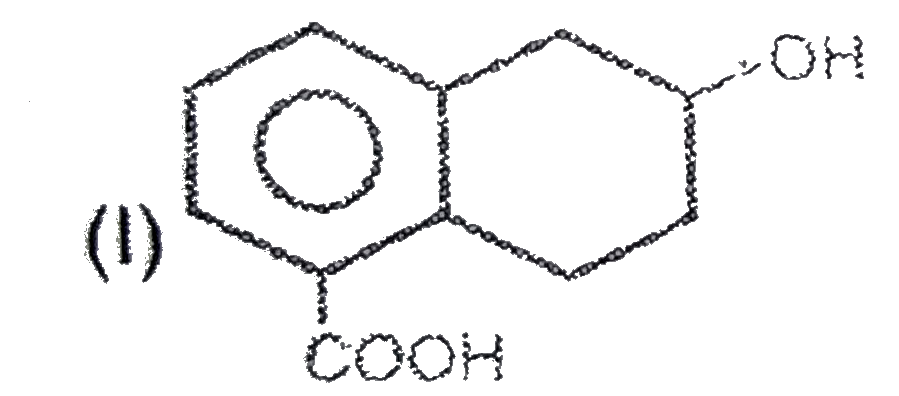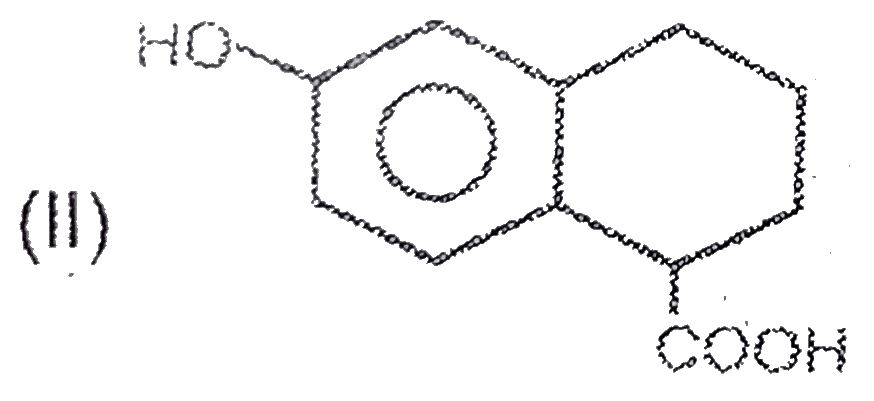The following two compounds and can be distinguished by using reagent

(a) aq. " " (b) Neutral
(c ) Fehling solution " " (d) metal
or c
or c
or
ro
The correct Answer is:B
(a) Both does not give the test with aq. .
(v) give test with neutral due to presence of phenolic group, but does not.
( c) In aromatic aldehyde does not give Fehling test but gives.
(d) In and acidic hydrogen atom is present so both give test with metal.
Topper's Solved these Questions
- STRUCTURAL IDENTIFICATIONBOOK - RESONANCECHAPTER - STRUCTURAL IDENTIFICATIONEXERCISE - Advanced level Problems (Part-II)
21 Videos
- STRUCTURAL IDENTIFICATIONBOOK - RESONANCECHAPTER - STRUCTURAL IDENTIFICATIONEXERCISE - Advanced level Problems (Part-III)
12 Videos
- STRUCTURAL IDENTIFICATIONBOOK - RESONANCECHAPTER - STRUCTURAL IDENTIFICATIONEXERCISE - Exercise-3 Jee (Advanced) (Part-II)
15 Videos
- STEREOISOMERISMBOOK - RESONANCECHAPTER - STEREOISOMERISMEXERCISE - EXERCISE (PART III : PRACTICE TEST-2 (IIT-JEE (ADVANCED PATTERN))
22 Videos
- SURFACE CHEMISTRYBOOK - RESONANCECHAPTER - SURFACE CHEMISTRYEXERCISE - Section - 5
1 Videos
Similar Questions
The following two compounds I and II can be distinguished by using reagent
 " "
" " 
(a) aq. NaHCO3 " " (b) Neutral FeCl3
(c ) Blue litmus solution " " Na metal " " (e) HCl/ZnCl2 anhydrous
View SolutionThe following two compounds I and II can be distinguished by using reagent

(a) aq. NaHCO3 , Neutral FeCl3
(b) Blue litmus solution , Na metal
(c) HCl/ZnCl2 anhydrous
View Solution
Knowledge Check
The following two compounds I and II can be distinguished by using reagent
 " "
" " 
(a) aq. NaHCO3 " " (b) Neutral FeCl3
(c ) Blue litmus solution " " Na metal " " (e) HCl/ZnCl2 anhydrousAa or cBb or eCd or eDc or dThe following two compounds I and II can be distinguished by using reagent

(a) aq. NaHCO3 (b) Neutral FeCl3
(c) Blue litmus solution (d) Na metal
(e) HCl/ZnCl2 anhydrousAa or cBb or cCc or dDb or dThe following two compounds I and II can be distinguished by using reagent

(a) aq. NaHCO3 (b) Neutral FeCl3
(c) Blue litmus solution (d) Na metal
(e) HCl/ZnCl2 anhydrousAa or cBb or eCd or eDc or d
The following two compounds I and II can be distinguished by using reagent

(1)Aq.NaHCO3 , (2)Neutral FeCl3(aq.)(FeCl3+NH4OH+H2O)
(3)Blue litmus solution , (4)Na metal
(5)HCl+ZnCl2(anhydrous)
View SolutionThe following two conpound I and II can be distinguished by using reagent:

(p) aq. NaHCO3 ltBrgt (Q) Nerutral FeCl3
( R ) blue litmus solution
(S) Na metal
(T) HCL/ZnCl2anhydrous
View SolutionThe following two compounds I and II can be distinguished by using reagent

(1)Aq.NaHCO3 , (2)Neutral FeCl3(aq.)(FeCl3+NH4OH+H2O)
(3)Blue litmus solution , (4)Na metal
(5)HCl+ZnCl2(anhydrous)
View SolutionWhich of the following pairs of compounds can be distinguished by using Fehling's Fehling's solution?
View SolutionCompounds I and II can be distinguished by using reagent.
(I) -4-Amino-2-methylbut-3-en-ol
(II) -4-Amino-2,2dimethylbut-3-yn-1-ol
View Solution
